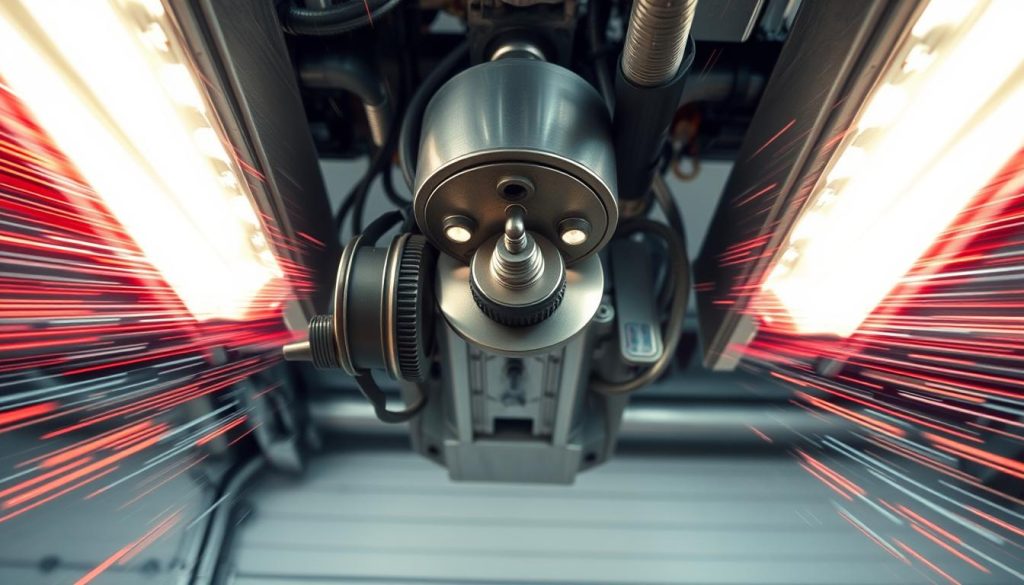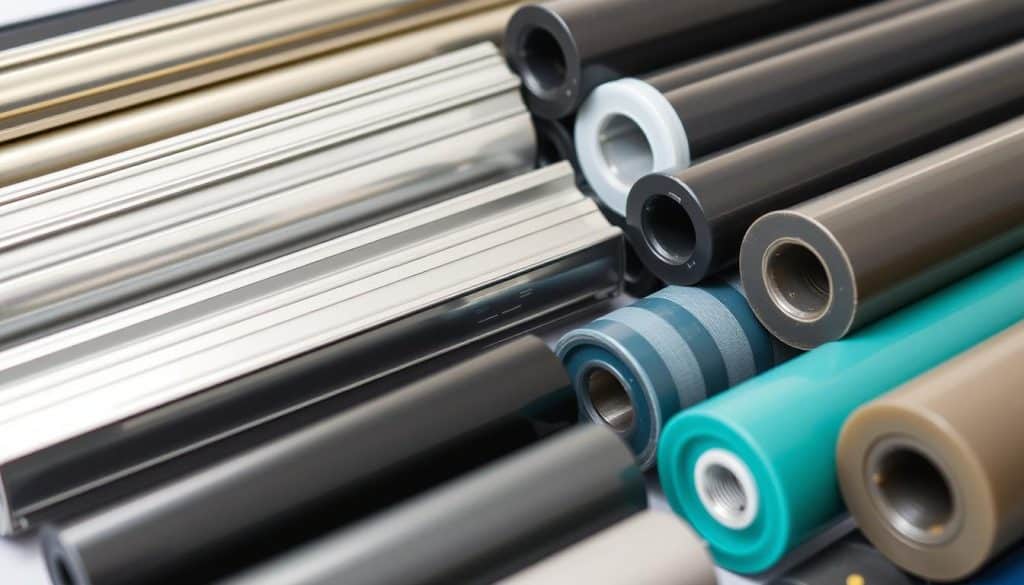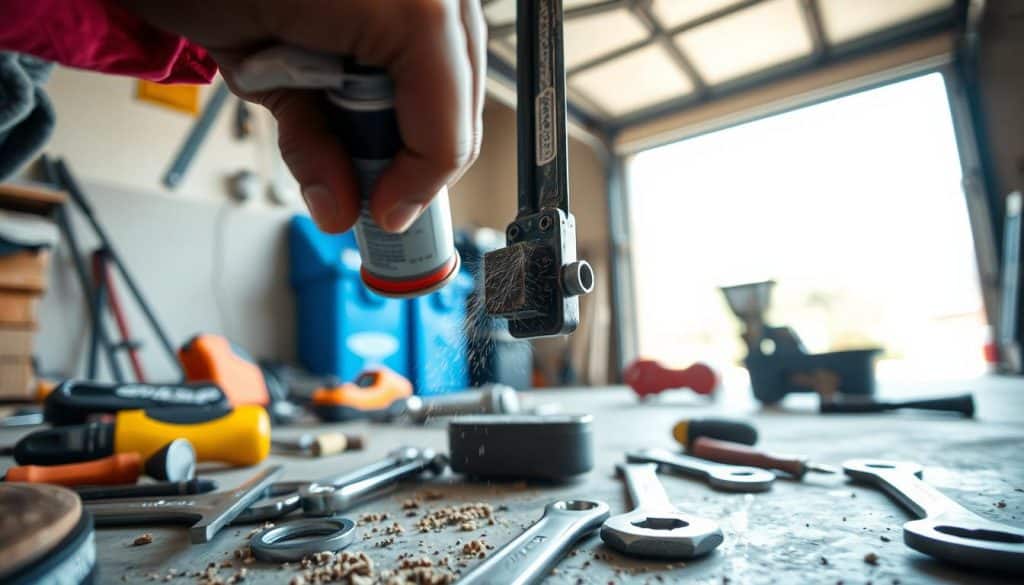Ever wondered Why is My Garage Door Making Loud Noises? Many homeowners face this issue, expecting quiet operation. Instead, they hear everything from slight creaks to loud bangs. It’s important to find out why this happens.
Worn parts, misaligned components, and lack of maintenance are common culprits. Knowing the cause helps us decide if we can fix it ourselves or need a professional. This affects our daily life, safety, and maintenance costs.
Key Takeaways
- Common issues causing garage door noise include worn rollers and misaligned tracks.
- Regular maintenance can significantly reduce or prevent loud garage door sounds.
- Loose hardware often leads to rattling and banging noises.
- Understanding the types of springs and their conditions is essential for noise management.
- Professional inspection can help avoid long-term noise issues and costly repairs.
Common Causes of Noisy Garage Doors
Noisy garage doors often signal underlying issues that require troubleshooting. Regular maintenance is key for a quiet and functional garage door. Several factors contribute to the sounds we hear when the garage door operates. Understanding these causes helps us fix noisy garage doors more effectively.
Chattering Springs
Worn springs can produce high-pitched or loud banging noises, noticeable during opening or closing. In fact, springs may account for noise in about 40% of cases. Adequate lubrication and regular inspections help mitigate these sounds and extend the lifespan of the springs.
Loose Hardware
Loose nuts, bolts, or screws can generate rattling or clanking noises. About 50% of garage door noise issues stem from this problem. By tightening hardware during a routine garage door inspection, we can significantly reduce unwanted sounds.
Misaligned Tracks
Bent or misaligned tracks contribute to screeching and thumping sounds, affecting nearly 65% of reported noisy garage doors. Ensuring that garage door tracks are straight and correctly aligned is essential for smooth operation and noise reduction.

The Importance of Garage Door Maintenance
Garage door maintenance is essential. It ensures our doors work smoothly and quietly. Regular checks and lubrication are very helpful.
Regular Inspections
Regular checks catch problems early. About 30% of issues come from loose parts. Tightening these parts helps a lot.
Also, 15% of problems are from misaligned sensors. Checking these sensors often keeps our doors running smoothly and quietly.
Lubrication of Moving Parts
Lubrication makes doors run smoothly and quietly. It can cut noise by up to 50%. Torsion springs, which last about 10,000 cycles, need lubrication to work well.
By lubricating regularly, we make our garage doors quieter and more reliable.
When to Call a Professional
Knowing when to call a professional for garage door problems can save us time and money. It also keeps us safe. There are clear signs that show we can’t handle it ourselves. Spotting these signs is key to keeping our garage door working well.
Signs of Serious Issues
Excessive noise, slow operation, and malfunctioning sensors are big red flags. Loose or broken parts can cause loud noises, affecting over 60% of commercial users. Worn-out rollers are another common problem, with about 30% of complaints.
A malfunctioning garage door can really slow things down, affecting almost 40% of commercial noise complaints. It’s clear that these issues need professional help.
Scheduling Timely Repairs
Fixing problems quickly can prevent bigger issues later. Regular maintenance and timely repairs can cut down noise levels by up to 30%. If your garage door has trouble moving, it might need a pro.
By getting repairs done on time, we can make our garage doors last longer. This improves their performance too.
Garage Door Opener Noises
Garage door opener noises often mean there’s a problem with your system. These sounds usually come from motor issues or chain drive problems. Knowing where the noise comes from is key to fixing it.
Motor Noises
Motor problems often make loud grinding or humming sounds. A good motor runs quietly. Any unusual noise might mean it’s wearing out.
Regular lubrication can help quiet down the motor. Also, check the motor mounts often. Make sure they’re tight to reduce vibrations. Ignoring these signs can lead to bigger issues, like the motor failing completely.
Chain and Belt Issues
Chain drive noises can come from not enough lubrication or being off track. A chain that’s not lubricated will make noise and wear out fast. It’s smart to lubricate the chain every six months, or sooner if you hear a lot of noise.
If your opener has a belt, make sure it’s tight and straight. A loose or old belt can cause rattling and grinding. Fixing these problems early can stop more damage and keep things quiet.
How Weather Affects Garage Doors
Weather changes can greatly affect our garage doors. Knowing how weather impacts garage door performance and noise is key. This knowledge helps us keep these important parts in top shape.
Temperature Changes
Extreme temperatures can really affect garage doors. In hot summers, metal parts can expand and cause problems. This leads to more noise.
In cold winters, parts can become brittle and break easily. Regular checks during these seasons are vital. They help keep doors working well and quiet.
Humidity and Moisture Impact
High humidity and rain can make garage door issues worse. Parts like rollers can rust or wear out, causing noise. Up to 50% of complaints are due to these issues.
Regular maintenance, even in humid weather, can prevent these problems. It saves us from costly repairs later on.

The Role of Garage Door Rollers
Garage door rollers are key to smooth operation and less noise. Knowing the types of rollers and when to replace them boosts your garage door’s performance.
Types of Rollers
Garage doors use different types of rollers. You’ll often find nylon and metal rollers. Nylon rollers are quiet, cutting noise by up to 50% compared to metal rollers.
Metal rollers are durable but can make more noise if worn or not well-lubricated. Check your garage door’s rollers to see if an upgrade for quieter operation is needed.
When to Replace Rollers
Replacing garage door rollers is essential when they wear out or get damaged. Look for signs like more noise and trouble opening the door. Regular checks every 3-6 months can spot problems early.
Worn rollers can increase friction by 50%, causing noise. Installing the right rollers can make your home quieter. If your garage door is too loud, it’s time to replace the rollers for better performance and less noise.
Understanding Garage Door Springs
Garage door springs are key to smooth door operation. Knowing the difference between torsion and extension springs is important. Sounds from our garage doors can hint at spring problems.
Torsion vs. Extension Springs
Torsion springs are the top choice for garage doors because they’re durable and safe. They can last up to 15,000 uses. Extension springs, while cheaper, last about 10,000 cycles.
Torsion springs curl and rotate, while extension springs stretch and contract. Keeping them well-maintained is vital. Regular checks can spot wear and ensure they work right.
Sound Indications of Spring Problems
Listen for squeaks or grinding sounds, as they often mean spring trouble. These noises can show up if springs need oil or are wearing out. Loud bangs or a door shutting too fast might mean broken springs, often with extension springs.
Regular maintenance, like using silicone-based lubricants, can cut down on noise and wear. It can also make springs last 20-30% longer. Catching these sounds early can save us from big repair costs later.
Preventive Measures for Noise Reduction
To reduce garage door noise, we need to mix DIY maintenance with expert advice. Taking early action can greatly cut down on unwanted sounds. Learning simple tasks can make a big difference in our garage door’s noise levels.
DIY Maintenance Tips
Regular maintenance is key for less noise. Tightening loose parts can cut noise by about 10%. Lubricating moving parts well is also important, as bad lubrication causes about 70% of noise problems.
Using the right lubricants can reduce friction noise by up to 20%. Switching to nylon rollers from metal can make your garage door quieter by 25-30%. Also, checking track alignment is important, as misaligned tracks can raise noise by over 50%.
Professional Maintenance Plans
Some noise issues need a pro’s touch. Getting regular maintenance from experts can catch and fix big noise problems fast. These services include checks, lubrication, and adjustments that can make parts last up to 50% longer.
Experts can spot issues early, saving us from 50-80% in repair costs. A good maintenance plan improves your garage door’s performance and quietness.
Emerald Garage Door Services: Our Commitment
At Emerald Garage Door Services, we know how important a working garage door is. It keeps your home or business safe and convenient. We aim to give top-notch repairs and make sure you trust your garage door system.
Family-Owned Values
We’re a family-owned business, and we value our community and customers. We treat you like family, knowing what matters most in your area. Our commitment to honesty and trust shows in every service we provide.
Licensed, Insured, and Bonded
Choosing us means you’re protected. We’re licensed and insured, so you’re safe in case of an accident. We focus on safety and quality, ensuring our team is well-trained and follows the rules. Count on us for dependable, professional service.
Why Choose Us for Your Garage Door Needs?
We are the top choice for homeowners when it comes to garage door services. Our commitment to quality and reliability makes us stand out. By choosing Emerald Garage Door Services, you can trust us to handle your garage door needs with professionalism.
Experienced Technicians
Our team has experienced garage door technicians who know how to fix various issues. They use the latest tools and methods for efficient repairs and installations. They can fix noisy garage doors or replace the entire system, making your experience quieter and hassle-free.
Exceptional Customer Service
We know that great customer service is key to our business. We focus on your needs, providing clear communication and support. Our friendly staff aims to make sure you’re happy. Choosing us means you get quality work and the care you deserve as a valued customer.
Contact Emerald Garage Door Services
Need help with your garage door? We’re here for you. Our team can fix, maintain, or install your garage door. Regular checks can make your doors last longer and keep you safe.
Call Us Today: (407) 788-1229
Need help? Our experts are ready to assist. We know all about garage doors and can answer your questions. We serve Orlando, FL, and the surrounding areas.
Service Areas: Orlando, FL, and Surrounding Areas
We cover Orlando, FL, and nearby areas. Our goal is to provide quick and reliable service. If your garage door is making noise, call us today. We want your door to work perfectly.


